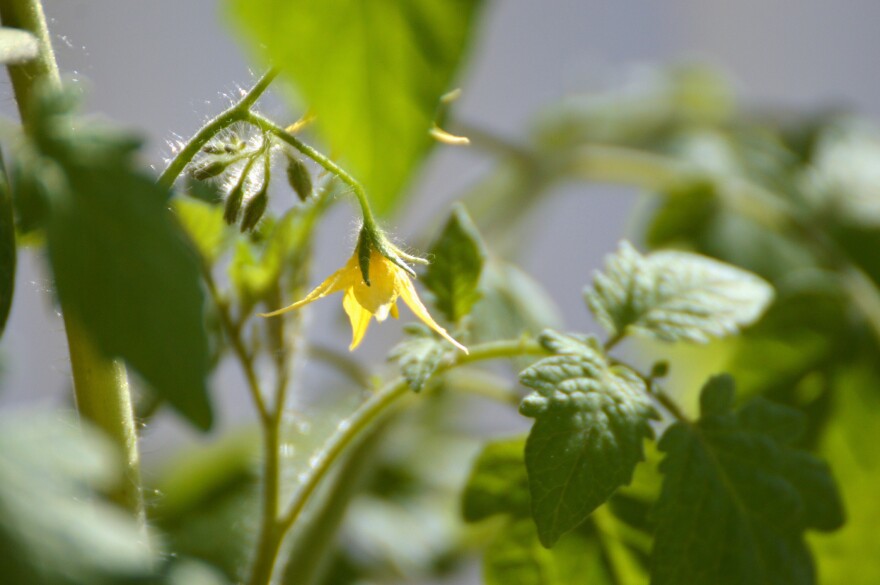Often, with tomatoes, you plant them in the ground and step away, feeling pretty confident. Then, a month or two later, you notice something on the plants' leaves that need attention.
Instead of waiting for foliar diseases and fungus to ruin your freshly sliced tomato-and-mayo sandwich dreams, learn how to prevent a few common tomato plant problems before they begin.
Firstly, if you haven't planted tomatoes yet in your garden or raised bed, you still have plenty of time.
Even if you get them in the ground in late June, you will get plenty of tomatoes before the first frost in the fall.
Choose the types of tomatoes you like, plant them, then mulch! This one simple act will help in a multitude of ways.
Adding a layer of mulch material underneath your tomato plants preserves the soil moisture. This will help ensure your plants won't dry out as fast.
This mulching practice also helps slow down a lot of foliar diseases, like the fungus, alternaria solani or early blight.
Mulching can also keep your plants from getting septoria leaf spots. When it rains, this mulch barrier makes it less likely that the fungus spores that cause leaf spots will splash up onto the leaves.
As for the mulching material itself, you can use hay, straw or even wood and bark chips.
Go a step further by taking a good look at the leaves near the bottom of the plant stem. If they show signs of any kind of disease on them, strip them right off.
Some gardeners go even further and strip all the leaves of their plants off all the way up to the first set of flowers.
Having fewer leaves on the plants makes it less likely they will fall prey to foliar disease later on in the season.
As we get into July, you'll start to see some suckers on your tomato plants. This is where the pinching comes in!
If you're growing large heirloom varieties like Brandywine, any suckers that form after early July won't have enough time to actually produce and mature some fruit.
The exception to the pinch-the-suckers rule is if you have planted cherry tomato varieties. They will keep producing and because they're smaller, will have enough time to mature.
And there is some data showing that planting Genovese basil around your tomato plants can confuse a tomato hornworm moth.
Hornworm moths generally lay their eggs on tomatoes but using this companion-planting method could discourage them. The strongly scented basil may cause the moth to move on and leave your tomato plants alone.
I have two peony plants on my east side of my house that have been there for a decade or more and have been beautiful. They have not bloomed the last couple of years.
There are two changes that have happened. One, I now put compost down on the garden beds every early season for the last three years. I would think they would love that.
The second thing is later in the season for the last couple of years, they've had a white powdery substance all over them. And I don't know what that is or how to prevent it.
They have not bloomed for the last two years and they used to be absolutely glorious. Wondering what I'm doing wrong. - Mary, in Charlotte
A: If your peonies have not bloomed for the last two years, it's most likely due to not enough light.
If you've had peonies in the same spot for a number of years, other plants around them keep growing bigger and bigger.
This means the peonies are not getting the mandatory six to eight hours of light they need to flower.
This fall, you might want to dig up and move that peony plant to a sunnier spot.
Another cause could be that, if you've applied any kind of nitrogen fertilizer to your lawn, that could leach out into the peony root system. This can cause a plant that gets big and lush but doesn't flower.
And check around where you planted it. If the crown is two inches deep or if you've been mulching it or putting compost around it, you may have buried that crown a little bit deeper than two inches.
Too much mulch on the crown will stop it from blooming. Pull back some of that mulch and compost and see if that helps.
All Things Gardening is powered by you, the listener! Send your gardening questions and conundrums and Charlie may answer them in upcoming episodes. You can also leave a voicemail with your gardening question by calling Vermont Public at 1-800-639-2192.
Hear All Things Gardening during Weekend Edition Sunday with Vermont Public host Mary Engisch, Sunday mornings at 9:35.
Have questions, comments or tips? Send us a message or get in touch by tweeting us @vermontpublic.
We've closed our comments. Read about ways to get in touch here.







